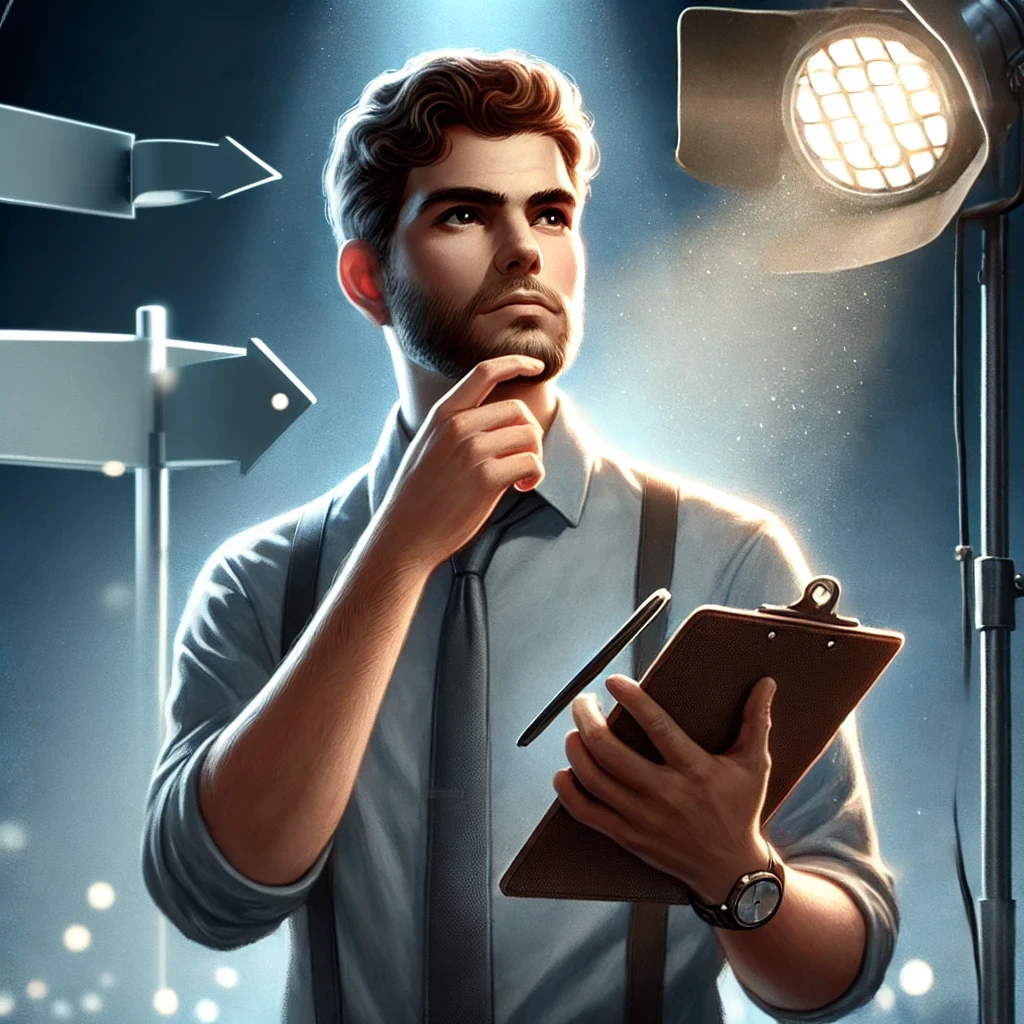
Navigating Life’s Stage: Becoming an Actor, Observer, or Reflector in Your Own Life
0
1
0

The Theatre of Life
Life is a grand stage, and each of us is both an audience member and a performer. Every day, we are presented with opportunities to make choices that impact not only our lives but also those of the people around us. Yet, how we participate on this stage varies from person to person. Some take centre stage, making bold moves and driving their own story. Others prefer to sit back and watch events unfold, observing from the safety of the wings. And some find themselves reflecting on what just happened, surprised by the outcomes because they weren’t fully engaged while life was happening.
Imagine life as a play where the actors are those who take charge, shaping the story with their decisions and actions. The observers are the audience, thoughtfully taking in the performance but not actively influencing the plot. The reflectors, meanwhile, find themselves thinking back after the curtain falls, wondering how the scenes played out the way they did. Each of these roles—the actor, observer, and reflector—reflects a mindset that shapes our experiences and outcomes.
The beauty of this metaphor is that none of these roles are fixed. We can be an actor in some moments, an observer in others, and a reflector at times, too. The key is recognising which role we tend to inhabit most often and learning how to embrace the moments when we want to step into a more empowered role. By understanding these three roles and discovering how to transition between them, we can take more control over our lives, personal growth, and happiness.
Let’s dive deeper into each role, meet some people who embody these mindsets, and explore how we can all take a more active role in our own lives.
The Actors: Making It Happen
Meet Alex, Jordan, and Taylor—three people who, despite their differences, share one important quality: they make things happen. They are the actors in the story of their lives, seizing opportunities, making decisions, and shaping their futures through deliberate actions.
Alex is analytical and cautious. He loves to think things through, weighing the pros and cons before taking any step. While his approach leads to well-informed decisions, it sometimes causes him to miss out on opportunities because he’s still calculating the risks when the chance passes by. But when Alex does act, his decisions are thoughtful and intentional.
Jordan is outgoing and spontaneous. She thrives on excitement and making quick decisions, often seizing opportunities as they come without worrying too much about the future. Jordan’s boldness and sense of adventure make her an unstoppable force, but sometimes her impulsive decisions lead to unintended consequences.
Taylor is creative and introspective. He spends a lot of time thinking about possibilities, dreaming up ideas, and setting ambitious goals. However, Taylor sometimes gets stuck in his head, dwelling too much on the planning stage and not taking enough concrete steps toward his goals.
What makes these three actors is not that they never hesitate or doubt. Rather, it’s that they are willing to step onto the stage and take action. They know that even when their actions don’t always lead to the desired outcome, they’re still moving forward, learning, and growing along the way.
Discovering Your Actor Type
Understanding how you naturally approach challenges can be empowering. Do you approach life cautiously like Alex, diving deep into analysis before making decisions? Or are you more like Jordan, always ready to jump in headfirst and figure things out as you go? Perhaps you’re like Taylor, constantly inspired by new ideas but sometimes hesitant to bring them into reality.
Taking time to assess your natural tendencies helps you make better decisions, set more realistic goals, and leverage your strengths. You might find that you’re a blend of these three types, depending on the situation.
Spotting Opportunities and Setting Goals
Once you’ve identified your actor type, you can start spotting opportunities that fit your strengths and working on goals that challenge you in the right ways. For Alex, this might mean learning to trust his instincts more and taking action faster. Jordan could benefit from pausing occasionally to consider the long-term impact of her decisions. Taylor, meanwhile, might focus on breaking his grand ideas into actionable steps so that his creativity leads to real-world results.
By engaging with others who embody different actor types, you can gain insights into how they handle challenges and opportunities. Sharing stories and strategies with a diverse group allows you to learn from their experiences and strengthen your approach.
Becoming an Empowered Actor
Action planning and role-playing are excellent tools for those who want to take their acting to the next level. Practicing different scenarios—whether it’s making a tough decision or stepping up in a leadership role—helps you build confidence in your ability to handle life’s challenges.
Ultimately, being an actor is about embracing your role in life and taking the reins. You may stumble, but each step you take brings you closer to becoming the empowered individual you want to be.
The Observers: Watching It Happen
Now, let’s meet Emma, Luca, and Sam. These three individuals prefer to watch from the sidelines rather than take centre stage. They are the observers, carefully studying what’s happening around them before deciding whether to get involved.
Emma is quiet and reflective. She prefers to observe from the background, often feeling more comfortable analysing situations than taking action. Emma’s tendency to stay in the shadows stems from a fear of making mistakes or being judged by others.
Luca is highly analytical, even more so than Alex. He likes to gather all the facts before making any decision. Luca’s thorough approach means he rarely makes mistakes, but it also leads to “analysis paralysis,” where he spends so much time thinking about what to do that he never actually does anything.
Sam is easy-going and content to let others take the lead. He enjoys watching the world around him without feeling the need to influence it. Sam’s laid-back attitude keeps him safe from risks, but it also means he often misses opportunities for personal or professional growth.
Understanding Observer Tendencies
For those who identify as observers, understanding the reasons behind their passive stance is the first step toward change. Emma might realise that her fear of judgment is holding her back from speaking up. Luca might come to understand that his need for perfect information is preventing him from taking action. Sam might discover that his laid-back nature is keeping him from pursuing the opportunities that could lead to growth.
Once you’ve gained this self-awareness, you can begin to make small shifts toward more active participation. The goal isn’t to abandon your thoughtful and reflective nature—it’s to balance observation with action.
The Impact of Observation on Growth
While being an observer has its advantages—it allows you to avoid risks and learn from others’ mistakes—it also limits your potential for growth. Observers miss out on opportunities because they’re waiting for the “perfect” moment to act. However, life doesn’t always provide perfect moments. Sometimes, you have to create them.
By sharing stories and experiences in group discussions, observers can learn from one another and see that it’s possible to step out of the shadows without abandoning their reflective nature. It’s about finding the courage to act when the time is right.
The Reflectors: Wondering What Happened
Lastly, let’s meet Mia, Dylan, and Aisha—three individuals who often find themselves looking back on life’s events and wondering what just happened. These are the reflectors, people who are so caught up in their thoughts or overwhelmed by the pace of life that they struggle to stay present.
Mia is often lost in her thoughts, so much so that she sometimes misses what’s happening right in front of her. She tends to reflect on past events with confusion, unsure of how she let certain opportunities slip by.
Dylan is frequently overwhelmed by the fast pace of life. He struggles to keep up with everything that’s happening, and this leaves him feeling disconnected from his own experiences.
Aisha finds herself surprised by outcomes she didn’t anticipate. She reacts passively to events and only reflects on them after they’ve occurred, wondering how things unfolded without her noticing.
Unraveling the Reflector Within
Reflectors often find themselves stuck in a cycle of confusion and disconnection because they’re not fully present in the moment. To break free from this cycle, it’s important to cultivate curiosity and presence. Mia might start by practicing mindfulness, bringing her awareness back to the present moment rather than getting lost in her thoughts. Dylan could work on breaking down overwhelming tasks into smaller, more manageable steps. Aisha might focus on asking more questions and engaging more deeply with her surroundings to prevent being caught off guard.
Analysing Past Events
Reflectors can also benefit from analysing past events to understand how they unfolded. By dissecting situations where they felt out of touch, reflectors can start to see where they might have been more engaged. This awareness helps them take more control over future outcomes.

Developing Awareness and Empowerment
Mindfulness practices, such as deep breathing and journaling, can help reflectors become more present in their daily lives. By staying engaged in the moment, they reduce the likelihood of being caught off guard or wondering how things slipped past them.
Reflectors like Mia, Dylan, and Aisha can learn to be more proactive in shaping their life narratives. The more present and aware they become, the less they’ll wonder about what happened—and the more they’ll be able to create the outcomes they want.
Conclusion: Taking Control of Your Life’s Narrative
No matter which role you tend to gravitate toward—actor, observer, or reflector—there is always room for growth and transformation. The most important takeaway is that you have the power to change your role at any moment. Life is not static, and neither are you.
By understanding your natural tendencies and embracing the tools to become more proactive, you can take control of your life’s narrative. Whether it’s by taking decisive action, stepping out of the observer’s seat, or becoming more present in the moment, you have the ability to shape your story.
So, what role will you play today? The stage is yours—step into the spotlight, embrace your role, and make things happen.














